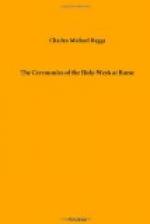[Footnote 2: If we compare with this term others of similar termination, such as sanctimonia from sanctus, we shall find in them a confirmation of the etymology given above: monia serves to form the substantive, but does not otherwise alter the meaning.]
[Footnote 3: S. Greg. M. lib. VII, epist. 64.]
[Footnote 4: See Le Brun, Explic. Missae T. 2. dis. 1. Also Renaudot. They have however been refuted by Assemani, Maratori and Zaccaria.]
[Footnote 5: The Pater noster is still said in secret, except after the canon of the Mass, because at that part of the Liturgy only the faithful were present. See Moroni’s learned work entitled, Dizionario di erudizione ecclesiastica.]
[Footnote 6: See Schelstratius, de Disciplina Arcani, or Trevern’s answer to Faber’s Difficulties of Romanism: also Bingham lib. X, c. 5. Times are now so much altered that it is difficult to conceive how the Reserve in communicating Religious knowledge recommended in one of the Tracts for the Times could be practicable, even if it were judged expedient.]
[Footnote 7: It was first published by B. Card. Tommasi from a very ancient manuscript in the queen of Sweden’s library. Cave, Mabillon, Muratori, Assemani and other eminent critics admit its authenticity. There is however another sacramentary perhaps more ancient called the Leonian, because it is attributed by the learned to Leo the great, A.D. 450. It was first published by Bianchini in the 4th volume of Anastasius the librarian from a Verona MS. written 1100 years ago.]
[Footnote 8: This new Gregorian sacramentary was carried to England by St. Augustin and the other missionaries. Mr. Palmer and after him Mr. Froude (Remains, vol. 2nd, p. 387) give a similar account of the Roman liturgy. They, like archbishop Wake, attribute the origin of the Roman, Oriental, Ethiopic and Mozarabic liturgies to St. Peter, St. James, St. Mark and St. John, and observe that all other liturgies are copied from one or other of these. “In each of these four original liturgies the eucharist is regarded as a mystery and as a sacrifice” p. 395: they all agree in the principal ceremonies of the mass, and all contain a prayer for the rest and peace of all those who have departed this life in God’s faith and fear” p. 393. “Now it may be reasonably presumed”, says archbishop Wake “that those passages wherein all these liturgies agree, in sense at least, if not in words, were first prescribed in the writings of the ancient fathers”. See Tracts for the times, no. 63.]
[Footnote 9: They who wish for further details may consult Le Brun, Card. Bona, Martene, Gavant, Rock’s Hierurgia etc.]




